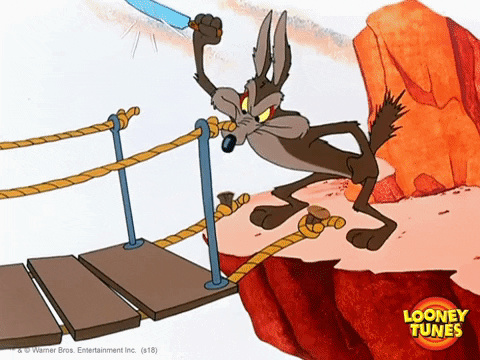Do you remember the Roadrunner cartoons? They’re a huge chunk of Americana that you can check out on YouTube. In the cartoons, the Roadrunner never speaks–his only words are a cheery “Beep! Beep!” He’s a cocky bird, zooming over tricky terrains–mountains above, cliffs below.
The Road Runner is constantly pursued by his nemesis, Wile E Coyote, whose life goal is to make the Roadrunner his lunch. He contrives elegant inventions worthy of Thomas Edison in order to trap the Roadrunner–it’s only that they always fail. The hapless coyote is blown up, run over, falling in slow motion thousands of feet to the canyon floor below.
Sometimes I end up rooting for Wile Coyote I gotta tell you. He may not be that smart, but he’s the kind of a plotting plodder I am. The Roadrunner runs fast, dashing past danger with ease. He doesn’t know the meaning of difficulty or fear. The reason we laugh at the Roadrunner is that we don’t know anyone who dodges dangers and difficulties like they weren’t even there.
I guess for most of us the bottom line is that I don’t know anyone like the Coyote whose best efforts always end up in disaster or anyone like the Roadrunner who is impervious to harm.
The truth is that we all carry around some version of the Roadrunner and the Coyote in our heads. Part of us, like the Roadrunner, believes we’ll speed through difficulties without a scratch and then there’s a Wile E. Coyote part of our brains that thinks that in spite of our best efforts we’ll end up losing and being splattered on the canyon floor.
I find that I spend a great amount of time each day managing these two contradictory parts of my brain, the Roadrunner part and the Wile Coyote part. It’s the way my mind works. Managing victory and defeat as they play out in my mind is the key to having a successful day.
Here’s the way the Roadrunner and Wile Coyote play out in my head each day. I wake up like the Roadrunner, my mind focused on my goals and to-do’s. The Roadrunner is my best thinking and actions, ready to roll.
But just as I run up my first hill and make the turn and my conscious mind is feeling like I’m hitting top speed, there’s Wile Coyote, who represents my subconscious, waiting for me around the corner with his first bomb of the day on his back. Like Wile Coyote, I become a co-conspirator in blowing up my own day.
Here are some tips to manage the Roadrunner and Coyote parts of our mind:
- Focus on your best thinking–like the Roadrunner, running fast and getting to where you’re going. The Road Runner part of your brain is actually the part that’s speaking in your head right now–your frontal context, the front part of your brain behind your forehead. The subconscious part of your brain is the Wile Coyote part. He suddenly appears with undermining thoughts–fears, resentments, lack of self-confidence.
- Deal with the thoughts that come to you. You most often don’t choose your thoughts–they choose you. Subconscious thoughts simply pop into your brain. You get great ideas and directions and great answers to what your mind is working on, but often the Wile Coyote part of your brain–regrets, fears, doubts, and self-criticism–attack you like an opposing force to what you want, need, and the direction where you want to go.
- Learn to intentionally manage your mind. You will become day by day who you think you are. Buddha, 2500 years ago, began to teach the idea of mindfulness–the act of consciously taking inventory of what’s going through your mind. We’re actually a complex combination of the Road Runner blasting through life to our goals, and Wile E Coyote, full of plots that ultimately blow up our lives. The ancient book of Proverbs put it his way, “As a man thinks in his heart, so is he.” We think our lives are built on fate and luck, and to a large extent they are, but our belief in ourselves tips the balance.
So in the end, we have the Roadrunner and Wile Coyote hanging out in the same brain. Managing those two aspects of the way we think is possible, although neither way of thinking will always win out. They are two counterbalancing principles that manage our tendencies toward unbridled narcissism and self-defeating behavior. It literally takes years of practice to be able to manage our minds, but it is the most important work of our lives.






